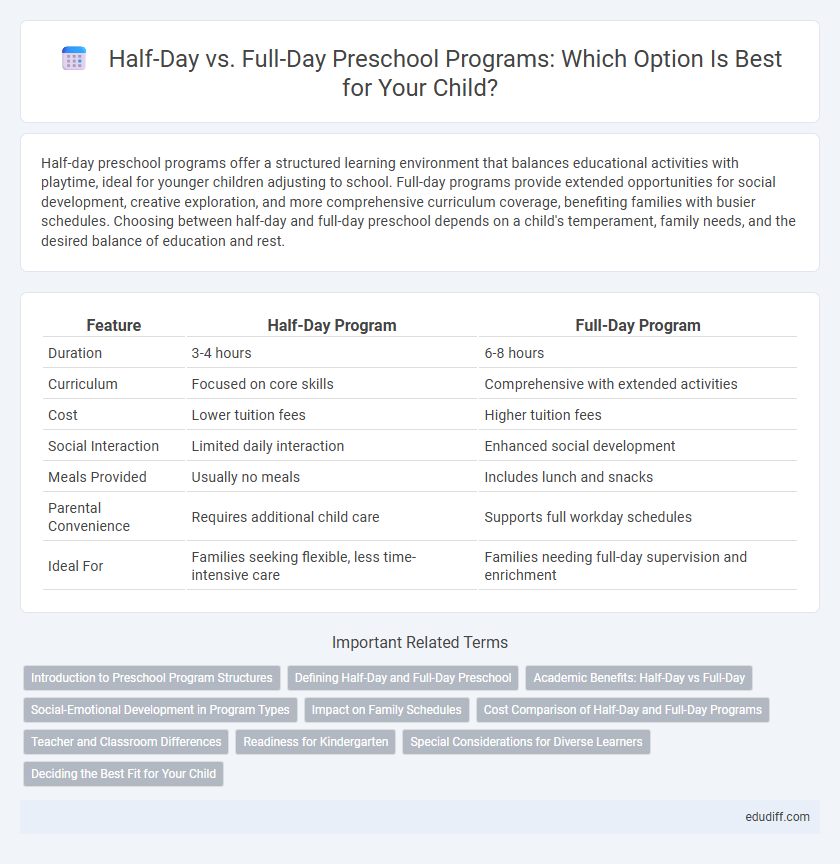Half-day preschool programs offer a structured learning environment that balances educational activities with playtime, ideal for younger children adjusting to school. Full-day programs provide extended opportunities for social development, creative exploration, and more comprehensive curriculum coverage, benefiting families with busier schedules. Choosing between half-day and full-day preschool depends on a child's temperament, family needs, and the desired balance of education and rest.
Table of Comparison
| Feature | Half-Day Program | Full-Day Program |
|---|---|---|
| Duration | 3-4 hours | 6-8 hours |
| Curriculum | Focused on core skills | Comprehensive with extended activities |
| Cost | Lower tuition fees | Higher tuition fees |
| Social Interaction | Limited daily interaction | Enhanced social development |
| Meals Provided | Usually no meals | Includes lunch and snacks |
| Parental Convenience | Requires additional child care | Supports full workday schedules |
| Ideal For | Families seeking flexible, less time-intensive care | Families needing full-day supervision and enrichment |
Introduction to Preschool Program Structures
Half-day preschool programs typically run for 2 to 4 hours and emphasize foundational skills such as socialization, basic literacy, and motor development. Full-day programs extend to 6 to 8 hours, offering a comprehensive curriculum that integrates academic learning with structured play, meals, and rest periods. Choosing between half-day and full-day options depends on family needs, child temperament, and desired educational outcomes.
Defining Half-Day and Full-Day Preschool
Half-day preschool programs typically run for 2 to 4 hours per session, focusing on early childhood development through structured play and basic academic activities. Full-day preschool programs extend to 6 to 8 hours, offering a comprehensive curriculum that includes meals, nap times, and extended learning opportunities. Parents often choose between these options based on their child's social needs, family schedule, and developmental goals.
Academic Benefits: Half-Day vs Full-Day
Full-day preschool programs provide extended learning time, boosting language development, social skills, and cognitive growth through diverse hands-on activities. Half-day programs offer foundational academic exposure but may limit opportunities for in-depth skill-building and sustained attention practice. Research indicates children in full-day programs often show greater progress in literacy and numeracy compared to their half-day counterparts.
Social-Emotional Development in Program Types
Full-day preschool programs offer extended opportunities for children to engage in social interactions, promoting stronger social-emotional development through consistent peer play and guided group activities. Half-day programs provide focused, high-quality interactions but may limit prolonged exposure to diverse social situations essential for emotional regulation and empathy growth. Research indicates children in full-day settings often exhibit enhanced emotional resilience and cooperative skills due to sustained social engagement throughout the day.
Impact on Family Schedules
Half-day preschool programs offer flexible scheduling that allows families to maintain consistent routines, accommodating parents' work hours and siblings' activities more easily. Full-day programs provide extended care, supporting families with full workdays but may require adjustments in pick-up and meal planning. Choosing between half-day and full-day preschool impacts family time management, daily logistics, and childcare costs significantly.
Cost Comparison of Half-Day and Full-Day Programs
Half-day preschool programs generally cost significantly less than full-day options, with average tuition ranging from $4,000 to $8,000 annually compared to $8,000 to $12,000 or more for full-day programs. Families often consider affordability alongside childcare needs, as full-day programs provide extended supervision but come with higher expenses including meals and additional activities. Budgeting for preschool requires evaluating the cost-benefit balance between reduced fees of half-day schedules and the comprehensive care offered by full-day enrollment.
Teacher and Classroom Differences
Full-day preschool programs often feature lower teacher-to-student ratios, allowing educators to provide more individualized attention and support compared to half-day settings. Classrooms in full-day programs are typically equipped with a wider range of learning materials and activity centers to accommodate extended schedules and diverse developmental needs. Teachers in half-day programs tend to focus on core academic and social skills, while full-day educators can integrate more comprehensive curricula including arts, physical education, and rest periods.
Readiness for Kindergarten
Full-day preschool programs provide extended learning opportunities that enhance social skills, cognitive development, and independence, fostering greater kindergarten readiness. Half-day programs offer foundational academic skills and social interaction but may limit the time children engage in diverse activities critical for comprehensive development. Research shows that children attending full-day preschool often demonstrate improved language, math skills, and classroom behavior, contributing to a smoother transition into kindergarten.
Special Considerations for Diverse Learners
Full-day preschool programs often provide extended opportunities for individualized support and social-emotional development crucial for diverse learners, accommodating different learning paces and sensory needs. Half-day programs may offer a less overwhelming environment, reducing fatigue and allowing time for therapeutic interventions outside school hours. Tailoring preschool schedules to meet the unique needs of children with disabilities, speech delays, or behavioral challenges promotes inclusive education and fosters optimal developmental outcomes.
Deciding the Best Fit for Your Child
Choosing between half-day and full-day preschool programs depends on your child's temperament, learning style, and family schedule. Half-day programs often foster social skills and provide a balanced routine, while full-day options offer extended learning opportunities and more structured play. Consider your child's energy levels, attention span, and need for rest to determine the optimal fit for their developmental needs.
Half-Day vs Full-Day Programs Infographic

 edudiff.com
edudiff.com